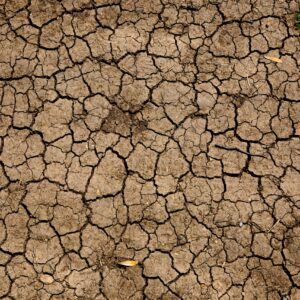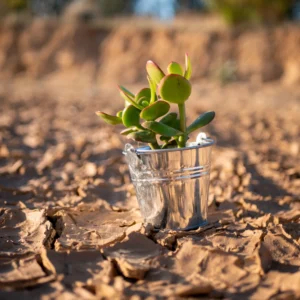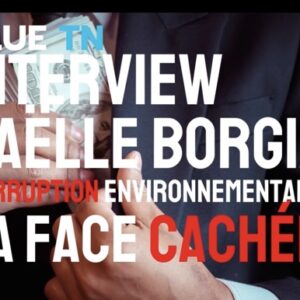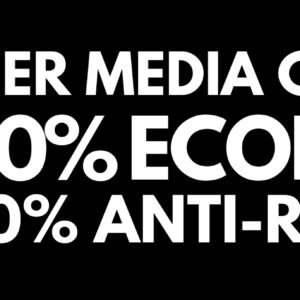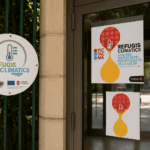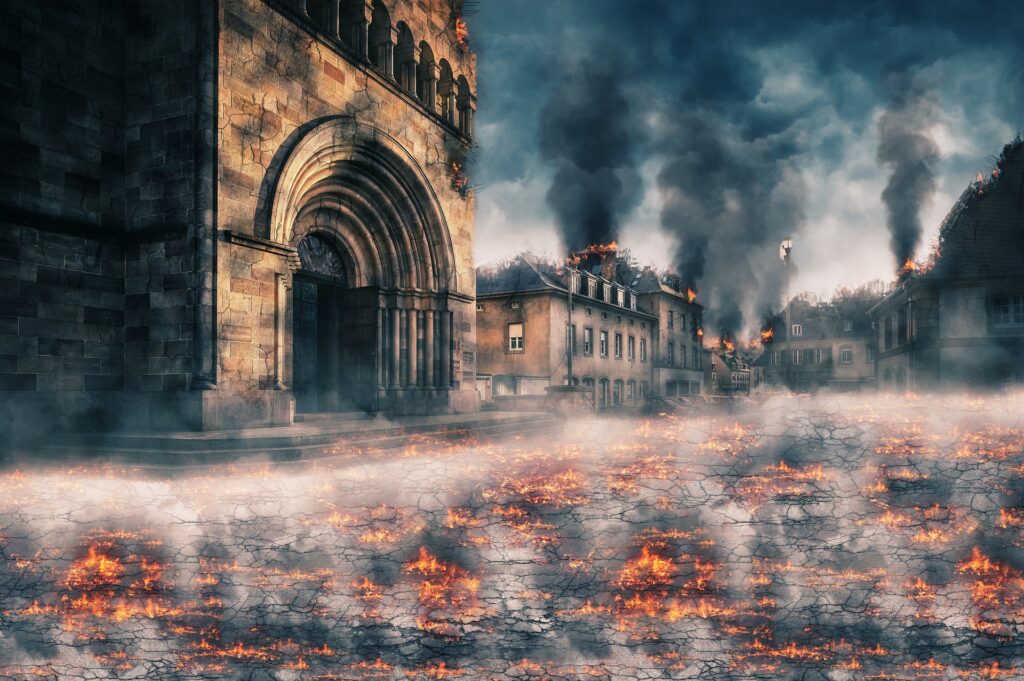
La Russie s’est déployée pour envahir l’Ukraine principalement pour redresser la situation économique actuelle en pillant les ressources énergétiques et alimentaires. Cependant, cela est désastreux pour la région de l’Europe de l’Est et catastrophique pour le monde. La contamination de l’eau, les sols endommagés et les gaz radioactifs et toxiques peuvent être irréversiblement nocifs pour l’écologie dans l’histoire de l’humanité.
Selon le Center for Strategic and International Studies, la Russie a mis en place un dispositif massif d’armes à distance de frappe de l’Ukraine, comprenant des chars, des pièces d’artillerie, des lance-roquettes, des systèmes de missiles balistiques et des véhicules de combat d’infanterie. Chaque canon lourd tiré libère une pollution atmosphérique nocive et chaque bombe crée une vaste zone de fumée. Par conséquent, ces armes peuvent incroyablement émettre une grande quantité de carbone dans la région.
48 heures plus tard, nous constatons déjà que les atteintes à l’environnement se multiplient en Ukraine !
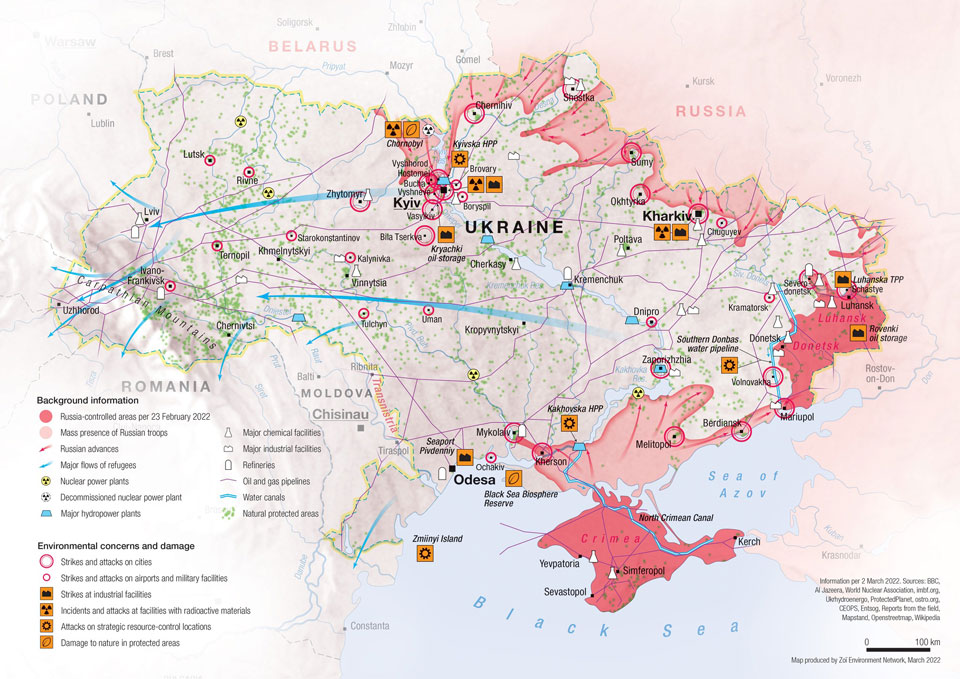
Politique en matière de changement climatique
« Selon les analystes, les pays européens peuvent rapidement réduire leur dépendance au gaz en adoptant des mesures d’efficacité énergétique et en augmentant les investissements dans les énergies renouvelables, qui sont déjà conformes à l’ambition de l’Europe d’arrêter de rejeter des gaz à effet de serre supplémentaires dans l’atmosphère d’ici le milieu du siècle. Le conflit en Ukraine pourrait accélérer certaines de ces mesures. Il pourrait également conduire à ce que Lisa Fischer, qui suit la politique énergétique au sein du groupe de recherche E3G, appelle « un changement tectonique » : utiliser les énergies renouvelables, plutôt qu’un vaste stockage de gaz, pour assurer la sécurité énergétique.
À court terme, les défenseurs du climat sont préoccupés par le fait que la guerre et les besoins en ressources de la Russie semblent avoir évincé le changement climatique de l’agenda politique. Je pense qu’il est tout à fait raisonnable d’abandonner la politique climatique pour tenter d’empêcher un fou meurtrier de détruire l’Ukraine et de porter ensuite son attention sur d’autres nations voisines. Alors que nous nous efforçons de trouver des sources d’énergie pour remplacer les combustibles fossiles de la Russie, l’impact à long terme de cette guerre pourrait et devrait être une augmentation de la demande d’énergie renouvelable.
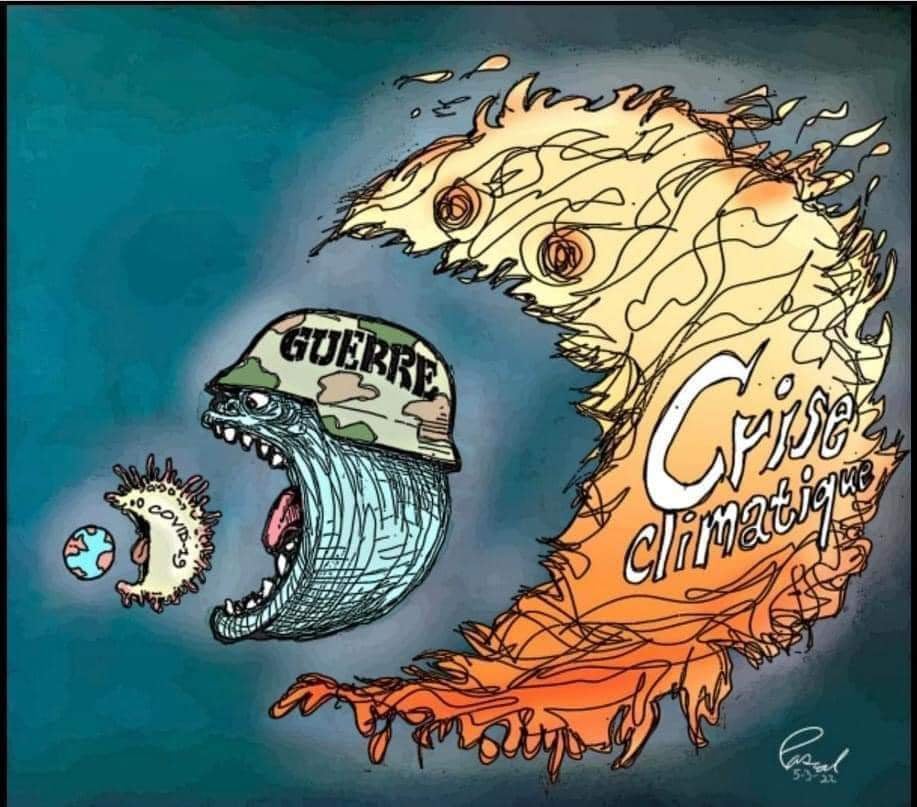
Dommages et déchets en échange de ressources naturelles
La conséquence est désagréable et va amplifier la crise écologique à traverser. On estime à 6 % la part des terres européennes qui seront touchées si cette tragédie se poursuit. Ce n’est pas seulement l’homme qui en souffrira, mais aussi 35 % de la biodiversité ukrainienne parmi les oiseaux, les plantes et les animaux qui sont en danger et dont certains risquent de périr, comme le Desmana Moschata et le Spalax Arenarius de Russie. Ainsi, plus de 70 000 espèces rares de faune et de flore seront touchées par ce conflit. En outre, 16% des surfaces forestières de l’Ukraine peuvent être brûlées ou sont menacées de l’être.
Pollution de l’eau
Le bassin de la mer Noire couvre presque entièrement le territoire de l’Ukraine, y compris plusieurs rivières qui traversent le pays. L’isolement de ces mers par rapport à l’océan ouvert a contribué à la grande diversité de leur flore et de leur faune. L’une des plantes les plus abondantes est le phytoplancton, une microalgue qui produit une quantité considérable d’oxygène. Par la suite, ces espèces d’algues sont menacées. Ainsi, la matière organique en décomposition a réduit les réserves d’oxygène, tuant les organismes vivant au fond de l’eau. Les rejets toxiques d’armes à feu et de résidus de bombes contenaient des niveaux extrêmement élevés de métaux lourds. Ces problèmes ont entraîné une forte diminution des ressources en fruits de mer. Si ces populations d’algues diminuent, cela provoquera par la suite une augmentation du niveau de CO2, car elles sont responsables de l’absorption d’une quantité colossale de dioxyde de carbone et de la libération d’une quantité massive d’oxygène dans l’atmosphère. D’une manière ou d’une autre, cette tragédie intensifiera le processus de changement climatique.
Malheureusement, 33 zones humides qui ont un statut d’importance internationale peuvent être remarquablement affectées. L’aquifère sera altéré par le fer, les chlorures, les sulfates et d’autres sels minéraux, ainsi que par des métaux lourds qui sont progressivement toxiques pour tous les êtres vivants de ce pays et de ses environs.
Détonateur pour bombe à radiations
En Ukraine, les observateurs estiment que la destruction de l’environnement risque d’empirer avant de s’améliorer, d’autant plus que les Russes s’efforcent de prendre le contrôle des principales villes du pays. Les attaques croissantes contre les infrastructures civiles au cours des derniers jours indiquent que les conditions vont empirer de façon exponentielle.
Au cours de cette guerre, les dégâts environnementaux sont difficiles à suivre et à mesurer. Le conflit a déjà suscité de vives inquiétudes, comme à Tchernobyl. Le scientifique affirme que des capteurs ont enregistré la semaine dernière des niveaux élevés de rayonnements gamma dans cette centrale dont l’état de la surveillance et de la maintenance est incertain. Il évoque également les explosions survenues dans un réservoir de pétrole dans la ville de Vasylkiv, juste à l’extérieur de Kiev, qui a rejeté des substances toxiques inconnues dans l’air.
Le pire, c’est que les centrales nucléaires risquent d’exploser à la suite de frappes aériennes accidentelles, comme la centrale nucléaire de Zaporizhzhia, l’une des plus gigantesques d’Europe. Il en résulte des radiations massives et dangereuses qui peuvent atteindre la taille d’un continent. Ainsi, une grande partie de l’Europe, y compris la Russie, sera entièrement inhabitable pendant au moins plusieurs décennies. Malheureusement, même la Tunisie peut être touchée par les radiations nucléaires, et cela peut être un désastre complet au niveau de l’environnement. Ces dernières années, la Tunisie a atteint un niveau record de pollution atmosphérique. Malheureusement, ces événements seront à coup sûr un catalyseur pour accélérer le processus de réchauffement climatique, ce qui aura des conséquences graves à prendre en compte pour un pays qui traverse une série de crises.
Cette invasion sera lourde de conséquences pour la situation mondiale dans laquelle nous vivons. Non seulement une hausse de la bourse des produits vitaux essentiels et une menace pour la sécurité alimentaire. Mais aussi, elle sera catastrophique pour l’environnement. C’est comme une bombe dont le compte à rebours a déjà commencé. La pollution de l’eau, la toxicité de l’air et les radiations sont autant de facteurs qui accentuent la crise écologique. Cet impact à grande échelle peut directement influencer notre vie quotidienne en Tunisie.
Allons-nous faire un pas de plus et commencer à réfléchir à l’importance de mettre en œuvre une stratégie afin d’entamer notre transition énergétique et de préserver notre nature ?
Copyright © 2022 Blue Tunisia. Tous droits réservés

